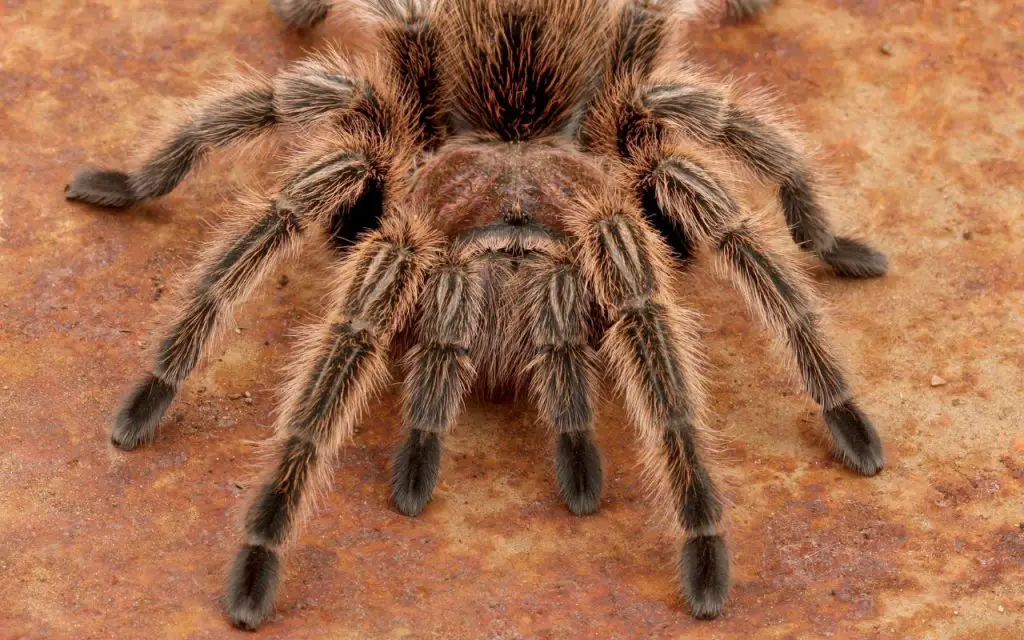Last updated on February 1st, 2023 at 09:55 am
How long do Rose Hair Tarantulas live? Males are very short-lived, but females can live for over a decade. This of course depends on the care they receive…
Rose Hair Tarantulas (Grammostola rosea/porteri) have a long lifespan. While males have a short lifespan from 2 to 5 years of age, females live much longer than males, reaching up to the age of 20 years and above on average. To make your pet live longer, focus on providing good care and appropriate food.
Rose Hair Tarantulas are commonly known as Chilean Rose Tarantulas or Chilean Fire Tarantulas. The scientific name for this species is Grammostola rosea. This tarantula is native to desert regions of Chile, as well as some regions of Argentina and Bolivia.
Some tarantulas are of light grey color. Other colors range from rose to pink, and a reddish brown color at times, and that is how they get their name.
Rose Hair Tarantulas are majorly nocturnal. Although they are also said to be wanderers as they are found to be roaming around in their habitat.
These tarantulas usually make their homes in empty rodent burrows. They are average in size as compared to other tarantulas, with a leg span of 4.5 to 5.5 inches.
How long do male Rose Hair Tarantulas live?
One of the more surprising facts about Rose Hair Tarantulas is that the males are exceptionally short-lived.
Like with all other spiders, Rose Hair Tarantulas molt too. It is a natural process that occurs several times in the lifecycle of spiders. While growing a new exoskeleton, tarantulas can behave differently. They would be lying flat on their back, laying still for long durations, and not eating.
The color of these spiders keeps getting darker before a molt and changes into their adult colors after the molting is completed.
Male spiders also molt multiple times in their lifespan. They reach their sexual maturity between the age of 2 and 3 years.
After reaching maturity, it becomes difficult for males to continue molting due to the fully developed sexual organs. They can’t continue further because usually, they die within a year or so, after reaching the age of maturity due to natural causes.
Once sexually mature, males can mate with female tarantulas. Once they mate, male spiders may simply die, or at times get eaten by the female spider.
Females sometimes eat a male spider after mating to provide nutrients for laying eggs.
As such, male tarantulas have an average lifespan of 2 to 5 years.
If they are taken as pets, under human care, or in captivity, the lifespan of males is increased due to lack of predators. They usually live up to 5 years of age.
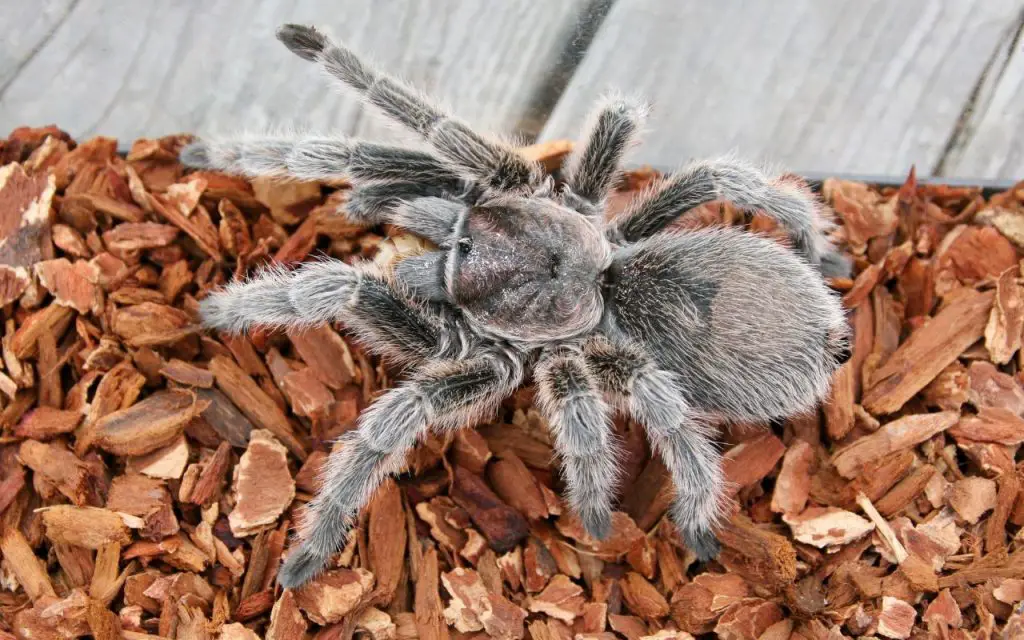
Female Rose Hair Tarantula lifespan
Female Rose Hair Tarantulas are no different, they keep molting throughout their lifecycle. The process of molting is continued even after reaching the age of sexual maturity.
Females become sexually mature around the age of 3 to 4 years, a little later than males. They keep on molting their exoskeleton even after reaching their full size.
After mating, a female tarantula lays eggs in huge numbers, around 80 to 1000 at a time. Females can continue laying eggs several times, laying around 3000 eggs on average in their lifespan.
Although, there are times when female tarantulas die after laying eggs for the first time. At other times, a female tarantula can eat a male tarantula after mating to provide nutrients for laying eggs.
Rose Hair Tarantulas have a long lifespan in comparison to other spiders.
A female tarantula can live up to 30 years of age in with a bit of luck. Often, they live around 20 years in captivity, the average being around 12 years.
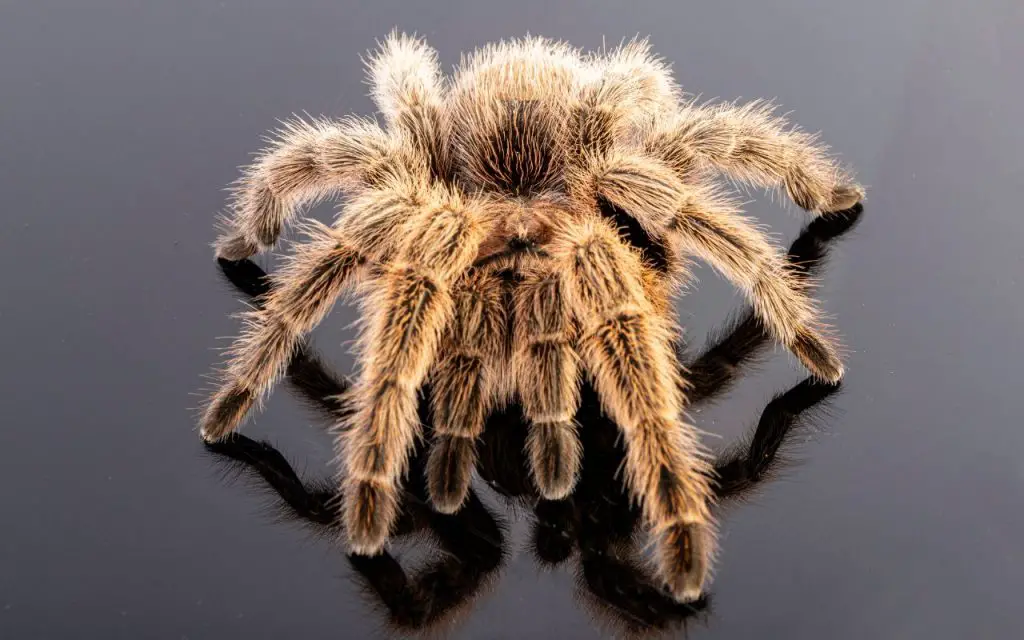
How long do Rose Hair Tarantulas live in captivity?
Rose Hair Tarantulas have a long lifespan. Male tarantulas have an average lifespan of 5 years, whereas females can live up to 30 years of age.
However, in captivity, they need consistent, good quality care, with a focus on providing the correct humidity and food to live a long time. You can read more about this in our Chilean Rose Hair Tarantula care guide.
In captivity, females can live for an average of 20 years, while males have an average lifespan of 5 years.
How old is my Rose Hair Tarantula?
Examining the age of a Rose Hair Tarantula is one of the most difficult factors in learning about this tarantula.
To determine the gender of a tarantula, the presence or absence of fusillae is checked. Fusillae are short, stiff hair found on the rear of the abdomen of a tarantula.
Gender can be easily identified as females do not possess fusillae, whereas male tarantulas do.
To determine the age is a tricky thing and is checked differently depending on the gender.
For male tarantulas, their pedilaps are checked. If they are large in size and bulbous, then they have reached the stage of maturity.
Another sign of maturity in males is the presence of tibial spurs located on the front legs looking like hooks.
In the case of female tarantulas, determining their age is even more difficult. Some owners wait for them to molt, and check the presence of spermatheca through a microscopic examination.
At the stage of maturity, female tarantulas are two-thirds the size of their full-grown size.
A male tarantula, not at the stage of maturity may age around 2 to 5 years. Whereas, a mature male may age around 4 to 6.5 years.
Female tarantulas on the other hand, if not mature may age around 2 to 5 years. If they have reached the stage of maturity, their age may range anywhere between 2 to 38 years.
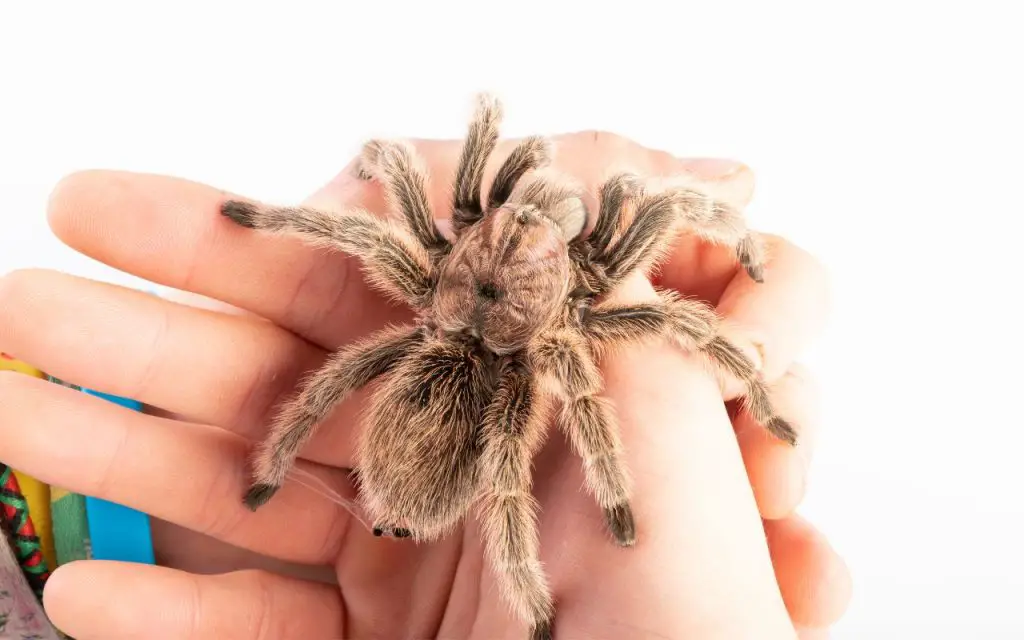
Are Rose Hair Tarantulas good for beginners?
There are two main types of Tarantulas: Ground-dwellers and tree-dwellers. Ground-dwellers are often considered a better option as pets for beginners.
Rose Hair Tarantulas are the best-known species for beginners because they require minimum care and attention.
They have a hardy exoskeleton and do not require a high level of humidity. Care should be taken when the spider is molting and food and water should be provided lesser during this period.
Rose Hair Tarantula size
The size of Rose Hair Tarantulas is known to be medium size in comparison to other species. The leg span of tarantulas stretches around 5 inches and their bodies are about 3 inches long.
Mature female tarantulas are larger than males. As these spiders keep molting and growing, female tarantulas get bigger than males.
Rose Hair Tarantula price
The price of a Rose Hair tarantula is estimated to be between $20 and $60 on average. These rates for this animal depend on various factors such as size, age, and color.
The cost also depends on the gender of this species. Females usually cost more than male tarantulas as they live longer and are bigger.
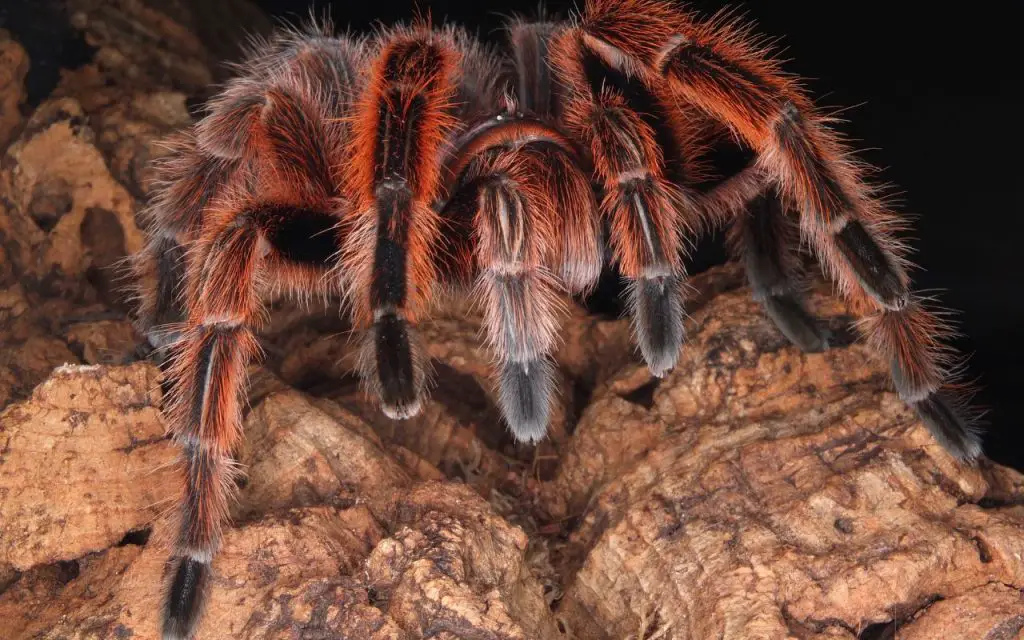
Rose Hair Tarantula for sale
Rose Hair Tarantulas are quite popular among spiders and there is a high demand for them as pet animals. Due to this, they are easily available for sale.
Several pet stores and online stores do carry them for sale. However, it is suggested to buy them from a reputable source after doing proper research.
It is better to buy them from an expert breeder or a rescue organization.
Female Rose Hair Tarantula for sale
Rose Hair Tarantulas are better to buy from experts and known breeders of the species.
Due to the popularity of this species among the masses, they are easily available. Female tarantulas are expensive compared to their male counterparts as they live longer and are larger.
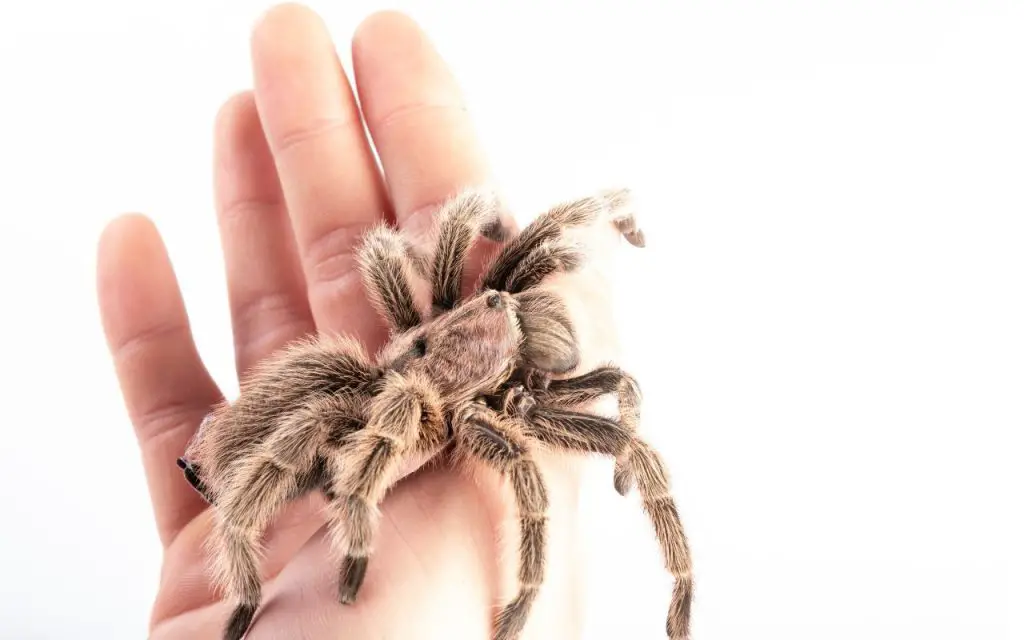
FAQ relating to ‘How long do Rose Hair Tarantulas live?’
Rose Hair Tarantulas are one of the species of tarantulas that have a long lifespan compared to other species. This is one of the reasons for many people preferring them as pets.
The average life of a male tarantula is 2 to 3 years.
While female tarantulas can live longer than males. They can live around for 30 years, and about 20 years even in captivity.
How old is my Rose Hair Tarantula?
Male and female tarantulas have different lifespans. Determining the age of a Rose Hair Tarantula is very challenging due to multiple factors.
A male tarantula who has not yet matured may age around 2 to 5 years. Whereas, a male tarantula that has reached the stage of maturity may age around 4 to 6.5 years.
In the case of female tarantulas, if it has not yet matured then they may age around 2 to 5 years. If they have matured, their age may range anywhere between 2 to 38 years.
How big do Rose Hair Tarantulas get?
The species Grammostola rosea, known as Rose Hair Tarantulas are medium in size in comparison to other species of tarantulas.
Adult tarantulas have an average leg span of 5 inches and the body size is around 3 inches. Within the species, female tarantulas are bigger than males.
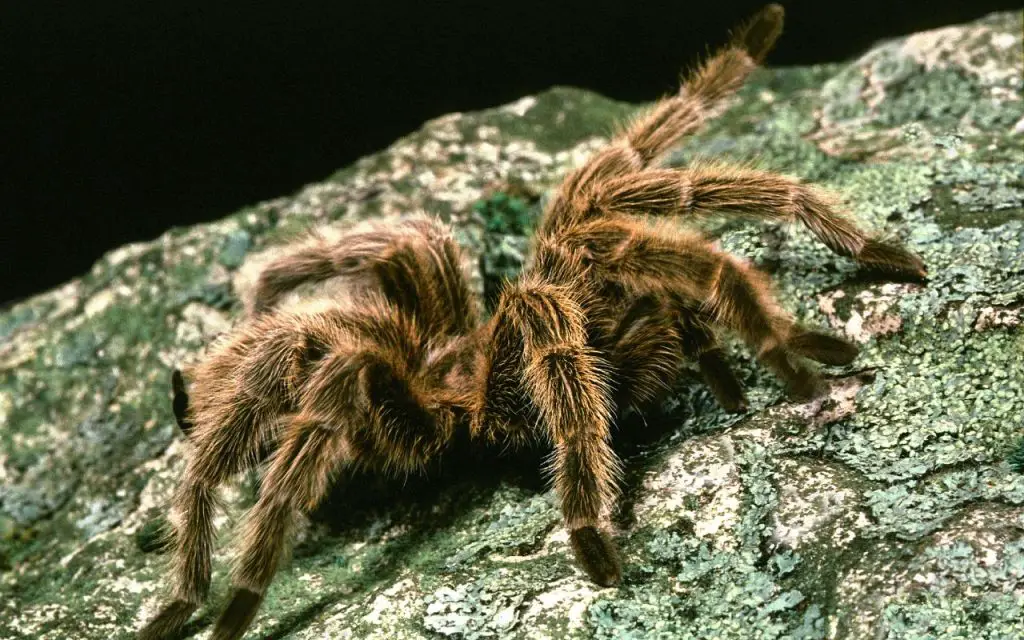
Do Rose Hair Tarantulas bite?
The known characteristics of Rose Hair Tarantulas are that they are medium-sized tarantulas. Their colors vary such as light grey, pink, or reddish brown.
The behavior and temperament of different tarantula species vary. The Rose Hair Tarantulas are known to be a very docile species and are easy to handle and care for.
Although, poor handling of any species can irritate them and make them feel as if they are in danger. Proper handling of Rose Hair Tarantulas should be done, especially if they are taken as pets.
When they feel threatened, they raise their legs and show off their fangs.
At other times, these tarantulas can kick their urticating hair from their abdomen and can lead to irritation to the skin or if inhaled, the lungs too.
In extreme cases, tarantulas can even bite. When you understand the warning signs and defensive behaviors of your tarantula, it becomes easier to handle them and prevent yourself from being bitten.
What happens if a Rose Hair Tarantula bites you?
Rose Hair Tarantulas are not known to be venomous, although they do possess mild venom. In the case of humans, a bite of a tarantula does not lead to major effects or any danger to life.
When a Rose Hair Tarantula bites, it feels like the sting of a bee. It leads to pain, irritation, and burning.
In some cases, people might have an allergic reaction to the bite and the venom. In these cases of serious reactions, it is advised to seek medical attention.
Wearing gloves is suggested while holding a tarantula for better protection and safety, especially in the initial stages of getting to know the behaviors of the spider.

